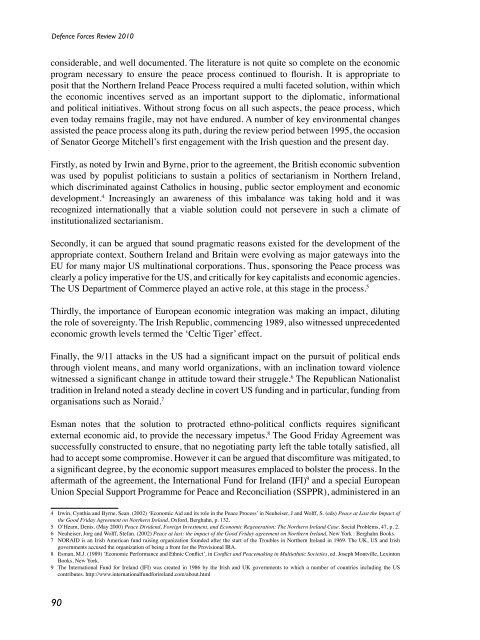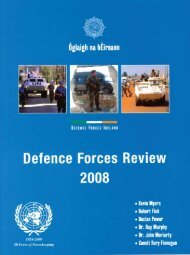Defence Forces Review 2010
Defence Forces Review 2010
Defence Forces Review 2010
You also want an ePaper? Increase the reach of your titles
YUMPU automatically turns print PDFs into web optimized ePapers that Google loves.
<strong>Defence</strong> <strong>Forces</strong> <strong>Review</strong> <strong>2010</strong>considerable, and well documented. The literature is not quite so complete on the economicprogram necessary to ensure the peace process continued to flourish. It is appropriate toposit that the Northern Ireland Peace Process required a multi faceted solution, within whichthe economic incentives served as an important support to the diplomatic, informationaland political initiatives. Without strong focus on all such aspects, the peace process, whicheven today remains fragile, may not have endured. A number of key environmental changesassisted the peace process along its path, during the review period between 1995, the occasionof Senator George Mitchell’s first engagement with the Irish question and the present day.Firstly, as noted by Irwin and Byrne, prior to the agreement, the British economic subventionwas used by populist politicians to sustain a politics of sectarianism in Northern Ireland,which discriminated against Catholics in housing, public sector employment and economicdevelopment. 4 Increasingly an awareness of this imbalance was taking hold and it wasrecognized internationally that a viable solution could not persevere in such a climate ofinstitutionalized sectarianism.Secondly, it can be argued that sound pragmatic reasons existed for the development of theappropriate context. Southern Ireland and Britain were evolving as major gateways into theEU for many major US multinational corporations. Thus, sponsoring the Peace process wasclearly a policy imperative for the US, and critically for key capitalists and economic agencies.The US Department of Commerce played an active role, at this stage in the process. 5Thirdly, the importance of European economic integration was making an impact, dilutingthe role of sovereignty. The Irish Republic, commencing 1989, also witnessed unprecedentedeconomic growth levels termed the ‘Celtic Tiger’ effect.Finally, the 9/11 attacks in the US had a significant impact on the pursuit of political endsthrough violent means, and many world organizations, with an inclination toward violencewitnessed a significant change in attitude toward their struggle. 6 The Republican Nationalisttradition in Ireland noted a steady decline in covert US funding and in particular, funding fromorganisations such as Noraid. 7Esman notes that the solution to protracted ethno-political conflicts requires significantexternal economic aid, to provide the necessary impetus. 8 The Good Friday Agreement wassuccessfully constructed to ensure, that no negotiating party left the table totally satisfied, allhad to accept some compromise. However it can be argued that discomfiture was mitigated, toa significant degree, by the economic support measures emplaced to bolster the process. In theaftermath of the agreement, the International Fund for Ireland (IFI) 9 and a special EuropeanUnion Special Support Programme for Peace and Reconciliation (SSPPR), administered in an4 Irwin, Cynthia and Byrne, Sean. (2002) ‘Economic Aid and its role in the Peace Process’ in Neuheiser, J and Wolff, S. (eds) Peace at Last the Impact ofthe Good Friday Agreement on Northern Ireland, Oxford, Berghahn, p. 132.5 O’Hearn, Denis. (May 2000) Peace Dividend, Foreign Investment, and Economic Regeneration: The Northern Ireland Case. Social Problems, 47, p. 2.6 Neuheiser, Jorg and Wolff, Stefan. (2002) Peace at last: the impact of the Good Friday agreement on Northern Ireland, New York : Berghahn Books.7 NORAID is an Irish American fund raising organization founded after the start of the Troubles in Northern Ireland in 1969. The UK, US and Irishgovernments accused the organization of being a front for the Provisional IRA.8 Esman, M.J. (1989) ‘Economic Performance and Ethnic Conflict’, in Conflict and Peacemaking in Multiethnic Societies, ed. Joseph Montville, LexintonBooks, New York.9 The International Fund for Ireland (IFI) was created in 1986 by the Irish and UK governments to which a number of countries including the UScontributes. http://www.internationalfundforireland.com/about.html90
















